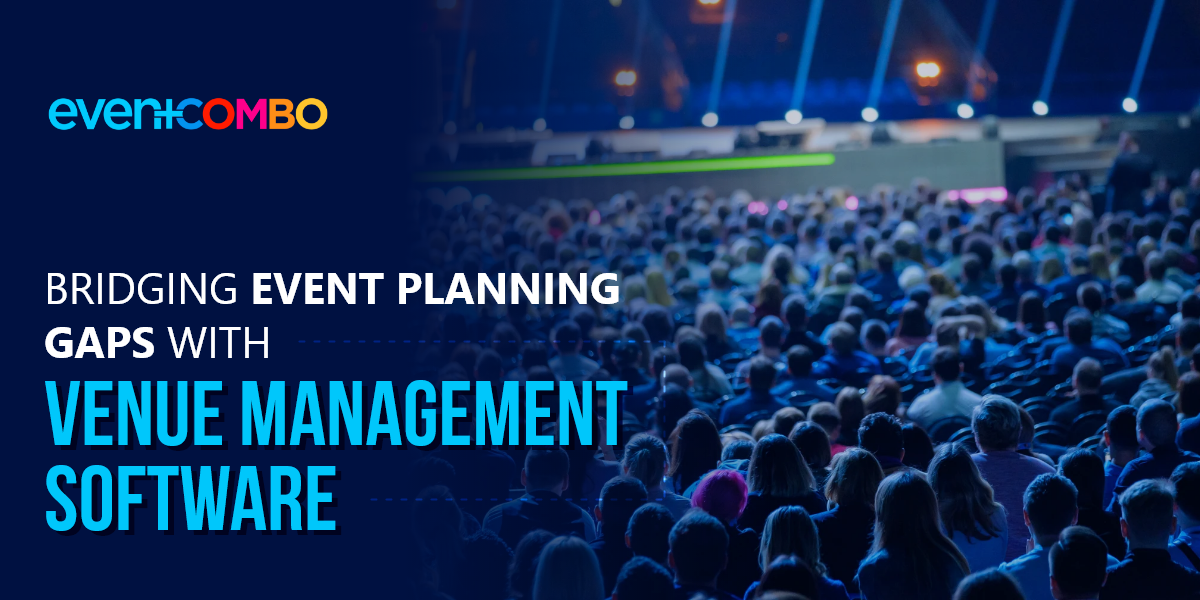

The events industry market is undergoing a seismic shift, with projections pointing towards a staggering USD 1,752.9 billion valuation by 2032. Amidst this surge, the spotlight shines brightly on in-person gatherings, set to reach a substantial $1177.1 billion, growing at a steady 5.9% annually.
However, this surge is reshaping how venue settings are managed, prompting event planners to seek a systematic approach through venue management software.
What Makes Event Venue Sourcing Difficult?
Event Venue Sourcing is not a one-dimensional feat. While it begins with hunting a suitable venue, there are several other factors that come into play. However, the big question remains: how do you select the perfect venue for your events?
Does it start with manually scouring venue lists on various search engines, making countless calls, and sending numerous emails? - YES!
And after all this hassle, when you’ve finally found the ideal setting, you realize that it lacks the necessary event venue amenities like AV setup or proper acoustics.
Let’s take another scenario: Imagine what happens if the venue manager or the client requests last-minute changes (which happens more often)? Coordinating these updates in real-time with your team means juggling emails and texts across multiple WhatsApp groups.
Keeping track of all these details in a spreadsheet, one event after another is overwhelming, making venue management efforts hectic and frustrating.
The Changing Event Venue Landscape
The events industry's current momentum is firmly rooted in in-person gatherings. This isn't just about major trade shows and expansive exhibitions but also stems significantly from the surge in meetings, conferences, and accelerator programs.
Clearly, the experience of these IRL events relies greatly on a crucial element: the perfect venue. More than just a physical space, a perfect venue must seamlessly align with organizers' visions, ensuring every detail—from guest arrival to departure—is meticulously orchestrated.
Enter - Venue Management Software.
What Is Venue Management Software?
Venue management software is a powerful tool designed to streamline the entire process of managing event venues. Much like event management software, it offers a robust, single dashboard and a unified platform to oversee your event venue tasks from start to finish.
The tool goes beyond just securing a venue or space; it handles everything from detailed booking of catering and equipment to seating arrangements, room blocking, communication among stakeholders and a lot more.
It automates tasks that often overwhelm event planners such as manually sending out multiple RFPs, booking forms and emails, and maintaining excel logbooks for various vendors and facilities. The tool helps you streamline all these moving parts, automating tasks, and ensuring every service is accurately invoiced. All you need to do is pick the right tool that meets your unique requirements. One such tool is Eventcombo that offers an integrated comprehensive venue management tool stack tailored to your dynamic needs.
Why Do Event Planners Need Venue Management Software
Venue management software is crucial for event planners to streamline operations plagued by manual processes. Without automation, planners contend with laborious attendee registration, heightened data entry risks, and inefficient coordination of event logistics.
Lets discuss each concern in detail to understand the gaps in event venue planning. 
1. Inefficient Scheduling: Inefficient scheduling can lead to various setbacks, such as double bookings and service unavailability, causing chaos, displeased clients, and strained vendor relationships. Suppose client ‘A’ needs a meeting space for their annual town hall, and you propose a conference room, only to find out it's already booked for client 'B by another person from your team. Now, you're back to square one, scrambling for alternatives.
This root issue stems from a lack of real-time visibility disrupting schedules, jeopardizing client satisfaction and potential revenue opportunities.
2. Multiple Communication Channels: The endless options of communication channels used by event planning teams present significant challenges. In our previous example, supposing that the other person did inform you about the conference room booking, there are high chances that the message could easily get lost among flooding texts or be forgotten due to multiple WhatsApp groups within the team.
Moreover, external communications with clients for confirmations, cancellations, and updates add further complexity, resulting in delayed responses, misunderstandings, and disruptions in the workflow.
3. Unplanned Resource Allocation: Every resource in event planning is interconnected—whether it's equipment, staff, or furniture. As attendee numbers increase, so does the need for additional staff, chairs, and potentially better audio equipment. However, last-minute client requests can complicate matters when resource availability isn't clear.
For example, requiring extra staff at check-out points for event swag or gift bags without available personnel can lead to shortages or overages in resources. The result? Diminished quality of event, subpar experience for attendees and dissatisfaction among clients and vendors due to logistical disruptions.
4. Disjointed Data Sources: Are you still flipping through large books or juggling multiple spreadsheets and communication channels? Disjointed data sources prevent you from a centralized view of event details, like client preferences, vendor offerings, or list of requests, cancellations, and approvals. For example: Without a centralized system, you would struggle to know when to put a "Sold Out" sign or a "Booking Open" sign for a particular meeting space or caterer's seasonal menu.
This type of confusion can lead to planning errors, duplicate manual efforts, and inconsistent information relayed to clients, impacting their experience and hampering trust.
5. Fragmented Tools: Using disparate tools for event venue management, multiple software, apps, and platforms—increases the likelihood of errors. For instance, relying on different apps for internal team workflows, Gmail for emails, WhatsApp groups for quick texts, a CRM for client management, and then rely on separate Excel sheets for vendor lists, facilities management, and manual booking forms. This disjointed approach disrupts coordination among teams responsible for organizing the event, resulting in delays in decision-making and execution. Moreover, it blurs accountability and can result in overlooked details or mistakes due to urgent tasks being prioritized over comprehensive planning.
6. Unsatisfactory Client Service: Event planners serve as the critical link between clients or hosts and vendors. When this bridge is shaky, both sides struggle to align effectively. Clients turn to event planners for seamless coordination and ease of event planning. Any disruptions, like miscommunications, scheduling conflicts, or resource allocation issues mentioned earlier, directly impact client satisfaction and retention. Such challenges can lead to lost business opportunities, tarnish the venue's reputation, and strain vendor relationships.
7. Lack of Expense Management: When juggling multiple tasks, it's easy for the budget to slip through the cracks. Clients and sponsors often require early estimates and detailed views of expenses to make informed decisions. Poor expense tracking can result in budget overruns or underestimations, disrupting financial planning and directly impacting pricing strategies and client budgets.
As the event date approaches, the pressure to finalize preparations can overshadow financial considerations, potentially leading to overlooked details, negotiations, and confusion during final invoicing.
Benefits of Venue Management Software
Venue management software empowers event planners automate the event venue management vertical with a comprehensive tech stack that offers following benefits:

Must Have Features in a Venue Management Software
To fully reap the benefits of a venue management platform, ensure it offers the following features:
1. Comprehensive Venue Listing – One of the primary expectations from any venue management software is to save time and effort for all stakeholders involved, including clients, event planners, and venue managers alike.
2. Team Coordination – One crucial requirement for effective event planning is to have everything integrated within a single venue management software that enables you with the following:
3. Venue Amenities and Services - A venue is chosen based on its catering, amenities, and services. When you display a venue, make sure to incorporate the details below to provide a 360-degree view.
4. Floor Plan and Diagramming - Creating a seamless event setup is like putting together a jigsaw puzzle. Effective venue management software should include:
5. Invoicing - Invoicing plays a pivotal role in venue management, given the interconnected nature of each workflow. Without effective software oversight, invoicing processes can unnecessarily complicate operations. Key features to consider include:
6. Communication - Now that venue management process is streamlined, automating real-time information remains crucial for efficient operations. Here’s how effective venue management software achieves this:
7. Analytics - Every decision in venue planning hinges on data-driven insights, making a comprehensive snapshot of the entire venue essential.
How To Choose Best Venue Management Software
Navigating the saturated market of venue management software requires a strategic approach to ensure your choice aligns with your operational needs and avoids unnecessary costs and disruptions.
1. Assess Your Needs – Understand why you need venue management software. Consider your event types, team size, and specific operational needs. Evaluate what features are essential such as booking management, communication tools, and reporting capabilities.
2. Take a Demo - Request a detailed demo to experience the software firsthand. This interactive session will demonstrate how the software operates in real-world scenarios, helping you assess its usability and fit for your team's workflow.
3. Confirm Scalability - Ensure the software can accommodate your business growth. Inquire about its capability to handle multiple venues, simultaneous events, and future expansion plans. This ensures that the software can scale alongside your organization's needs.
4. Check Case Studies - Review case studies or customer testimonials to understand the software's track record. Look for examples of how it has addressed challenges in venue and event management to get insights into its effectiveness and reliability.
5. Understand The Migration Plan - Clarify the process for transitioning to the new software. Seek a clear migration plan that outlines data transfer procedures and integration with existing workflows. Ensure the sales team provides adequate customer support during implementation and ongoing operations.
6. Simple UI - Opt for software with an intuitive user interface and is easy to navigate. A user-friendly design minimizes training time and maximizes productivity for your team.
7. Integration Capabilities - Ensure your venue management software integrates seamlessly with your existing tools, whether for payments, CRM systems, or analytics, to facilitate efficient data flow across a wide range of third-party applications. This integration capability prevents duplication of efforts and enhances overall operational efficiency.
8. Security & Compliance - Prioritize software that meets stringent security standards and regulatory requirements. Ensure data encryption, access controls, and compliance with relevant laws (e.g., GDPR, CCPA, PIPEDA)
Venue management software simplifies your venue management woes, whether you're organizing internal company events or large-scale trade shows. It offers a seamless and efficient solution to all your event planning needs, regardless of event size or format. This efficacy offers more peace of mind, motivating you towards productive undertaking.
Choosing the right software can be daunting. Schedule a demo with Eventcombo to explore how our event venue management software can revolutionize your planning process. Discover its potential to enhance your event outcomes, elevate ROI, and strengthen your customer and stakeholder relationships.

Every event organizer knows the sinking feeling of watching a well-planned budget unravel. That initial estimate of $400,000 suddenly balloons to $540,000 due to unexpected fees and overlooked expenses.

Eventbrite is a common name in the event management space, but if you’re here, chances are it isn’t checking all your boxes. Like many professionals, you may be looking for Eventbrite alternatives or exploring...

Networking events remain the backbone of professional growth, whether you're building a business, recruiting talent, generating leads, or seeking strategic partnerships.